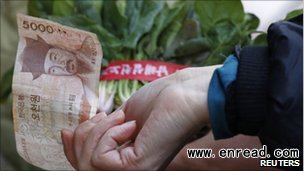韩国三月通货膨胀达新高
South Korea's inflation rate hit a 29-month high in March as higher fuel and food costs continue to push consumer prices.
韩国三月份通货膨胀率达最近29个月以来最高点,高额的油价和食品价格不断推动商品价格的增长。

Rising food costs are threatening growth in many of Asia's biggest economies
This is the second consecutive month that prices have risen more than the central bank's maximum target of 4%.
However, analysts say that this is unlikely to prompt the central bank to raise interest rates immediately.
"I think inflation is at its peak now and price pressure will start easing, partly helped by a strengthening won currency," said Kim Jin-Seong of Hanwha Securities.
"The better-than-expected data will lead the Bank of Korea to hold interest rates steady in April," he added.
Export growth
However, the central bank's decision may be influenced by the unexpected surge in export numbers.
Shipments from South Korea grew by 30% in March compared to the same month a year ago, according to the latest government data.
Exports for the month stood at $48.6bn (£30.3bn) compared with $45.5bn worth of imports.
Analysts say that while data was in line with recent trends, the surge in numbers was far bigger than what they had expected.
"In particular, exports spiked up far more than the market consensus this month," said Park Hee-Chan of Mirae Asset Securities.
"They will reinforce expectations for continued interest rate rises, despite negative external factors," he added.
Mr Park however said that the hike was unlikely to happen immediately.
"The Bank of Korea will likely take a pause in April before raising interest rates again in May."